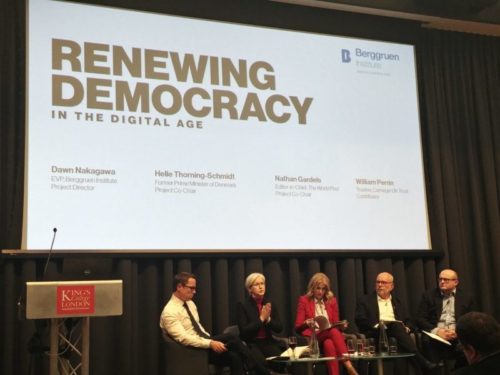The future of democracy and a duty of care

- by Maeve Walsh, Carnegie Associate
- 10 March 2020
- 3 minute read
A major new report has adopted the Carnegie UK Trust proposal for the introduction of a duty of care at an international level as one of its recommendations to preserve and strengthen democracy in an age of digital and social change.
The Berggruen Institute Future of Democracy programme has conducted a three-year comprehensive study on pathways for democratic reform that may strengthen democratic values, institutions, and outcomes, with a particular focus on strengthening democratic institutions and processes. Informed by international contributors and working group events, its authors set out an analysis of some of the challenges and threats that democratic institutions and values have faced in recent decades and the consequential rise in populism and extremism. They suggest that a desire for greater citizen participation in democracy has not been met by the necessary changes in the systems and processes to accommodate it, leading to a greater sense of disenchantment and disenfranchisement. The internet has allowed different ways to engage and participate politically to expand at pace. But at the same time:
“the new public square is largely digital, and the corruptibility of that space presents significant challenges to the constructive, informed engagement that this new democracy will require. While digital platforms have increased the opportunities for political engagement and feedback to our institutions, they also enable the distribution of conspiracy theories and misinformation by nefarious forces looking to deepen divisions and sow chaos. The public square required by a functional democracy built on broad engagement, must adequately and honestly inform citizens who feel free to engage in dialogue without persecution or threats to their well-being.”
The report, supported by a series of policy proposals by international contributors, focuses on three priority areas and recommendations:
- Renewing social cohesion, with proposals for the expansion of citizen service and the renewal of civic education and dialogue;
- Rebuilding the public square in the digital age, with proposals for a duty of care for social media platforms (supported by details of the proposal contributed by Carnegie UK Trustee, William Perrin), a windfall tax on platforms to fund local journalism and the establishment of a new set of principles for public interest journalism; and
- Renovating democratic institutions, including tools and mechanisms to enable greater civic and democratic participation by citizens
Speaking at an event on London last week to launch the report, William Perrin joined the project co-chairs Nathan Gardels and Helle Thorning-Schmidt, and Dawn Nakagawa of the Institute, in conversation with Matt Browne to discuss the ramifications of the report. For Thorning-Schmidt, the project had given her hope: there were “lots of citizens wanting to be part of the democratic process and social media is giving them agency that they didn’t have before”. The challenge was how to provide meaningful, ongoing engagement that docked formally with democratic processes and structures, as had happened in the recent Referendum on abortion in Ireland. Without that formal link and commitment to action, there is a risk that greater disengagement and disillusionment occurs. In the discussion on the public square in the digital age, the duty of care approach for regulation of social media plus action to address the impact of online advertising processes was also a key point of discussion, with the report’s package of measures “going further than the UK”, as Perrin pointed out, and setting out an opportunity to “redirect things in a more pro-social way, as democracies are entitled to do”. The full report can be found here.
Help us make the case for wellbeing policy
Keep in touch with Carnegie UK’s research and activities. Learn more about ways to get involved with our work.
"*" indicates required fields
